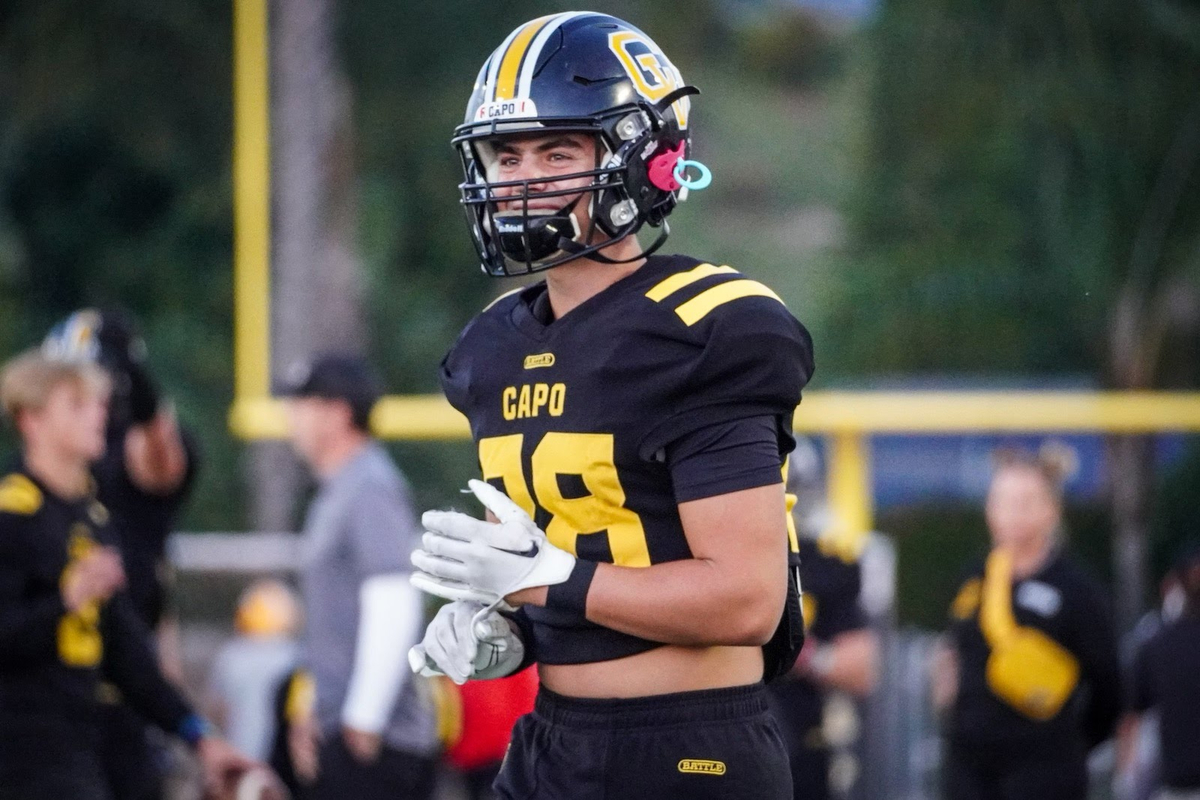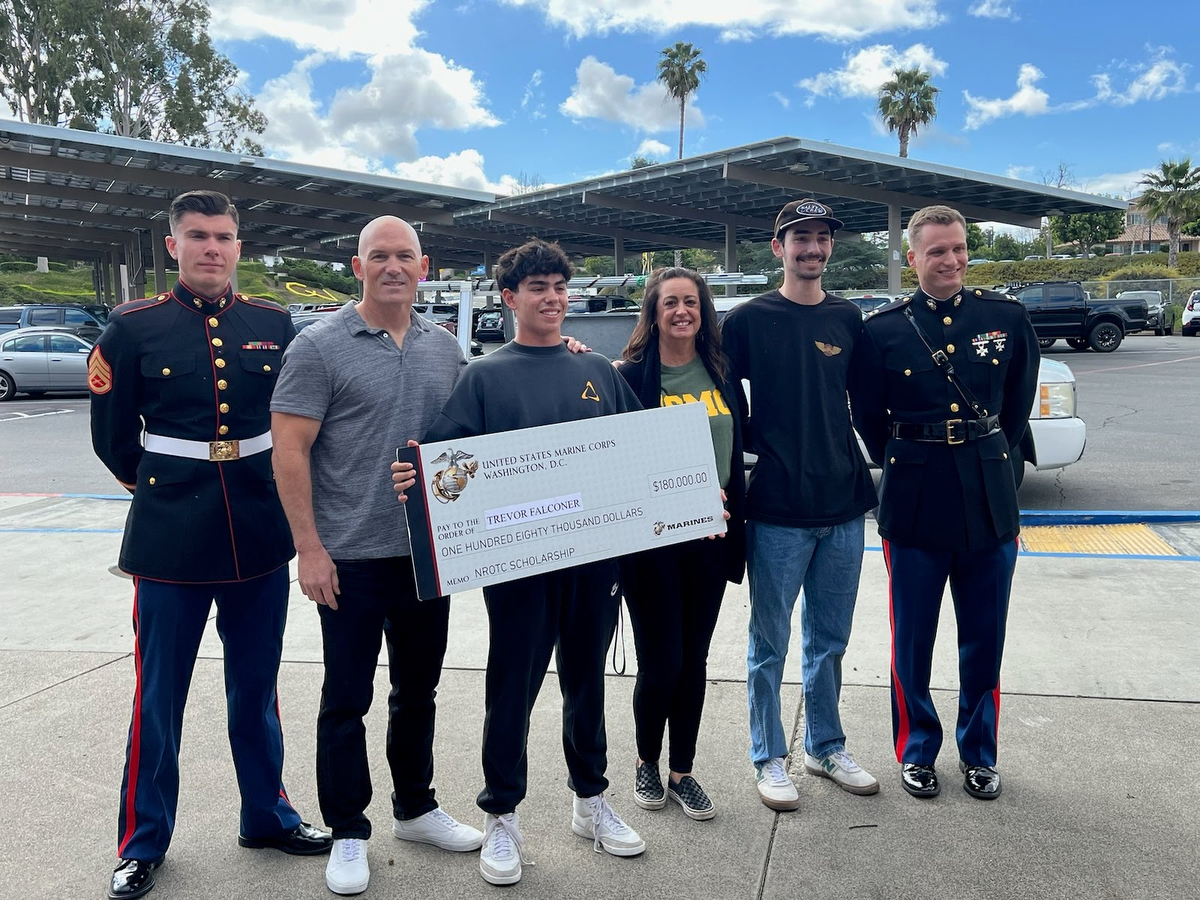By Greg Mellen
Trevor Falconer won’t be a full-fledged “oorah” Marine officer for a while, but he is well on the road.
When a group of Marines lets out the famous full-throated rally call it evokes a sense of camaraderie and esprit de corps. If all goes to plan, the Capistrano Valley High senior will join the “first on the ground” military forces within four years.
Falconer was recently offered one of the prestigious national Naval Reserve Officer Training Corps (NROTC) scholarships, a six-figure tuition discount, for students willing to join the Navy or Marine Corps after college graduation.
The Capistrano Valley High teenager has had a lifelong interest in joining the Armed Services from hearing his Marine grandfather’s tales of service in Vietnam.
“It was a superhero thing to be in the military,” Falconer said of his grandfather’s recounting.
However, until recently he had no real road map for joining, short of enlistment, which he had considered.
“I had my eyes on going in for four to six years,” he said, with the goal of learning engineering or some career path. “Then coming out with a clean (financial) slate.”
The high schooler was sure he didn’t want to incur a mountain of college debt. For that reason, despite a strong high school resume, he was also considering community colleges and technical schools for his post-secondary education.
That all changed in December after Falconer and his dad decided one day to go knocking on the doors of the Armed Forces Career Center in Mission Viejo. While the Air Force and Army recruiters weren’t in that day, the Marines were and were happy to chat.
When the recruiters heard the boy’s credentials, such as a 4.18 weighted GPA and varsity sports participation, it was clear that Falconer was not an everyday recruit.

A big award
Falconer learned about the Navy/Marine scholarship, which picks up either tuition and fees, or room and board, plus monthly and book stipends and uniform costs. At Arizona State University (ASU), where Falconer will attend, out-of-state tuition is more than $30,000 annually.
It was a heck of a deal.
“I was never aware of what ROTC was,” Falconer said.
Capistrano only recently launched a high school-level Reserve Officer Training Corps (ROTC) program at San Clemente High in 2023.
Although it was December and late in the application process, Falconer dove in, completing the extensive application and essays.
Then he waited.
“I kind of thought I had no chance,” he said.
Imagine his surprise when, while he was sitting in a school assembly, Marine Capt. Kevin McNeela and Staff Sgt. Lee Maxwell came in with an oversized check bearing Falconer’s name. The Marines had told Falconer’s family of the award so they could attend the presentation, but kept the information from the student.
“It almost killed my Mom to keep it a secret,” Falconer said.
McNeela, who oversees recruitment in Orange County and Southern L.A., said the scholarship is extremely competitive. This year, he said, about 16 students in Orange County and Southern Los Angeles County received the scholarships. From the entire West Coast and Pacific Rim the number was about 50.
“Off the bat he definitely stood out,” McNeela said. “He spoke clearly and strongly and had great eye contact, which you don’t get from many high schoolers.”
Maxwell was similarly impressed.
“When I first sat down with him and his dad and learned about his uncle (also a former Marine) and grandfather and learned he was interested in carrying on their legacy, I realized he had the kind of attitude that’s required of Marines,” Maxwell said. “He seemed a good fit.”
Asked about the Marine attitude, Maxwell said, “Willing to put the needs of others and of his country before himself.”

Photo courtesy of Trevor Falconer
Strings attached
As generous as the award is, it requires a big commitment. Recipients must serve a minimum of five years on active duty after college graduation. Added training-intensive pursuits, such as aviation, may require longer commitments. Those who join learn pretty quickly about military life and its requirements.
Before entering college, there is a required “New Student Indoctrination” in Great Lakes, Ill. That lasts for about 2.5 weeks and consists of a basic introduction to “basic military customs and courtesies,” according to McNeela.
Translation: formation, marching, physical training, more marching and training, disciplines such as shoe and brass cleaning, house cleaning, as well as team and unit building.
“It’s challenging,” McNeela said.
At school, Falconer said, he can take any major he wants and is considering business or finance. Falconer had considered mechanical engineering until he saw the course load of his older brother, Gavin, who is a senior majoring in engineering at Boise State.
He will also be required to participate in two or three days per week of drills and physical training before regular classes, as well as two academic courses: Naval science and military history.
In successive summers, Falconer will be required to spend a month in various programs. These include a summer orientation to various career paths and a month in Camp Pendleton learning outdoor and survival skills.
Before senior year, Falconer will attend Officer Candidate School in Quantico, Va., where he’ll get the full Marine experience.
That is when candidates receive intensive training that pushes them to the brink, breaks them down and builds them up, and tests their true commitment and mettle. According to McNeela, this is the first time the students go eyeball to eyeball with an active Marine training sergeant.
“They usually come back with a chip on their shoulder, which is what we want,” McNeela said of the Officer Candidate School experience.
It is the closest thing to being a true blue “oorah” Marine as students head into their final year of college.
McNeela said that traditionally, on graduation day, scholarship recipients go straight from their cap and gown ceremonies to donning their dress blues and taking the oath to “support and defend the Constitution…”.
Until then
For the time being, Falconer plans to enjoy his senior year in high school and play on the Cougars baseball team, for which he is a scrappy middle infielder.
While at ASU, in addition to classes, Falconer plans to take advantage of the weather and outdoor activities available in Arizona.
“Baseball and golf were part of the decision to go to ASU,” he said.
While in the Marines, which he will enter as a gold-bar second lieutenant, Falconer will consider his future career paths, whether in service or as a civilian.
“I had extreme anxiety about what I’d do (financially) without the military,” Falconer said. “Now, my life is kind of set out for me.”
And, as Maxwell says, he will be “worthy of the title of being a Marine.”

